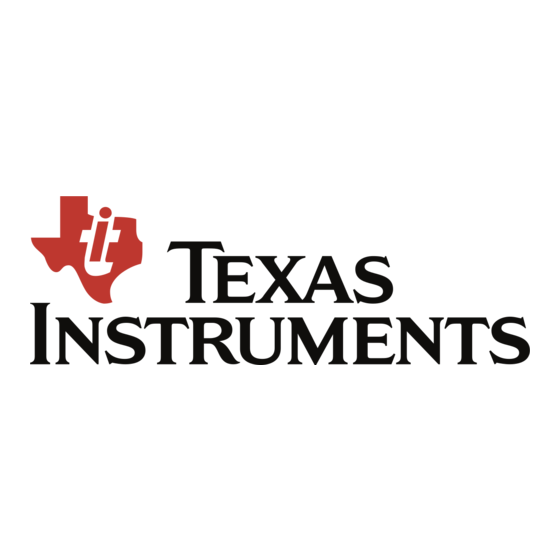
Summary of Contents for Texas Instruments DEV-RF002
- Page 1 B E A G L E B O N E B L E / W I F I C A P E DEV-RF002 Datasheet Version 1.3- May 2015...
- Page 2 This document is the property of, and is maintained by Dallas Logic Corporation. Please email any questions, corrections, or suggestions to requests@dallaslogic.com. Dallas Logic Corporation shall under no circumstances be liable for damages or related expenses resulting from the use of this document. Your use of this information indicates your understanding of, and agreement with the disclaimer located on the last page of this document.
-
Page 3: Table Of Contents
Table of Contents Introduction ........................5 DEV-RF002 Module Block Diagram ......................7 RF Section ........................7 CC2650 ..............................7 CC3100 ..............................8 Antenna Configuration Options ......................8 Digital Specifications ....................9 CC2650 Hardware ............................ 9 3.1.1 CC2650 Pin Definitions ............................9 3.1.2... - Page 4 Figure 3-2 DEV-RF002 expansion EEprom circuit ............12 Figure 5-1 DEV-RF002 Module Mechanical Dimensions ..........14 List of Tables Table 3-1 CC2650 pin description .................. 9 Table 3-2 CC3100 pin description ................11 Table 4-1 DEV-RF002 Voltage and Current by device ..........13...
-
Page 5: Introduction
1 Introduction The DEV-RF002 is a combination Wi-Fi / BLE SMART communication module. Below is a summary of the DEV-RF002 feature set: Texas instruments CC2650 SimpleLink™ Multi-standard wireless MCU (configured for BLE Smart). Dedicated CJTAG programming header. Dedicated Taiyo Yuden AH316M245001 chip antenna. -
Page 6: Figure 1-2 Dev_Rf002 P1 Pin Header
Figure 1-2 DEV_RF002 P1 pin header Figure 1-3 DEV-RF002 P2 pin header... -
Page 7: Dev-Rf002 Module Block Diagram
2 RF Section 2.1 CC2650 The DEV-RF002 utilizes the Texas Instruments CC2650 to provide BLE connectivity. The CC2650 is a flexible wireless MCU that can be configured to provide various connectivity standards and includes numerous peripherals. The flexibility of the CC2650 allows it to be configured in many ways with respect to the RF interface, connectivity protocol, clocks, and power supplies. -
Page 8: Antenna Configuration Options
Access Point, and Wi-Fi Direct. The device supports WPA2 personal and enterprise security and WPS 2.0 along with embedded TCP/IP and TLS/SSL stacks, HTTP server, and multiple Internet protocols. The two primary clocks for the CC3100 on the DEV-RF002 are provided by on board 40 MHz and 32.768 KHz crystals. -
Page 9: Digital Specifications
3 Digital Specifications 3.1 CC2650 Hardware The DEV-RF002 supports several communication interfaces which are provided by the CC2650 device. Included are one 4 wire SPI interface and one I2C interface. These interfaces are provided as pin connections on the modules P1 and P2 headers. Ten additional GPIO are available on the CC2650. These IO can be configured as generic peripheral input / output pins or programmed as communication interfaces including SPI, I2C and UART. -
Page 10: Cc2650 Programming Interface
3.2 CC3100 Hardware The DEV-RF002 supports two communication interfaces which are dedicated to the CC3100 device. These interfaces include one SPI interface and one UART interface. Both interfaces are provided as signals on connectors P1 and P2. 3.2.1... -
Page 11: Cc3100 Programming Interface
The Uniflash tool is available on a TI webpage located here: http://www.ti.com/tool/uniflash An optional programming method was released by Texas Instruments after the completion of the current demo design. This method allows users to reprogram the CC3100’s serial flash directly using the host MCU. A description of this technique can be found here: http://processors.wiki.ti.com/index.php/CC31xx_Host_Programming_Application... -
Page 12: Beagle Bone Black Configuration Interface
3.3 Beagle Bone Black Configuration Interface The DEV-Rf002 provides a footprint for a Beagle Bone Black (BBB) serial configuration device. Each cape must have its own EEPROM containing information that will allow the BBB to identify the board and to configure the expansion header pins as needed. -
Page 13: Beagle Bone Black Board Support
4.1 Voltage and Current Requirements The DEV-RF002 requires that a 3.3V power supply be connected to pins 3 & 4 of the P1 pin header. Both the CC2650 and CC3100 devices have on chip voltage regulators that provide the necessary power regulation. Both devices can accept up to a 3.6V power supply. -
Page 14: Mechanical And Environmental
5 Mechanical and Environmental 5.1 Mechanical The DEV-RF002 PCB dimensions are based on the BeagleBone cape hardware specifications to allow mating with a BeagleBone compliant carrier. The diagram below shows the mechanical dimensions of the DEV-RF002 BeagleBone cape. This diagram is re-printed here, for convenience, from the BeagleBone Black System Reference Manual Rev. -
Page 15: Environmental
The DEV-RF002 has components placed on the top side of the PCB only. This provides maximum dimensional clearance for components located on the host carrier board. The four tooling/mounting holes located at the four corners are 0.125in in diameter and are non-plated through holes (NPTH). The DEV-RF002 design uses four copper layers which include a power/ground plane pair, and a top and bottom routing layer pair. -
Page 16: References
BBONEBLK_SRM, BeagleBone Black System Reference Manual Rev C.1, May 2014. SBAS669, CC2650 Datasheet, Texas Instruments, February 2015. SWAS031C CC3100 Datasheet, Texas instruments, June 2013 – REVISED June 2014. 7 Disclaimer Information in this document concerning the devices, applications, or technology described is intended to suggest possible uses and may be superseded.











Need help?
Do you have a question about the DEV-RF002 and is the answer not in the manual?
Questions and answers